Valuations vs. Euphoria: Are investors still thinking clearly?
Does valuation still matter?
Early in my career, I had the privilege of being mentored by two silver-haired market veterans, Ian Huntley and Peter Warnes — co-authors of the Your Money Weekly stock report, which they launched in 1973.
Huntley's deep caution of bear markets instilled a culture of rigorous valuation discipline in our team.
Every stock recommendation made to our readers was expected to carry a margin of safety. Our assumptions were constantly challenged, with capital preservation and income growth treated as non-negotiable priorities.
These principles are easy to forget during bull markets. However, Huntley and Warnes would remind us of their experiences during the 1987 crash, the near-collapse of Westpac in 1992, and the dotcom bust.
The survival scars they carried from those periods were powerful reminders that extreme valuations are especially vulnerable to sudden, unforeseen risks.
When this risk materialises, capital can vanish — and the road to recovery can take years.
Fast forward to today, and the investing landscape looks radically different. Markets are now driven by passive flows and increasingly elastic valuations, while traditional stock reports have been replaced by Fintwit personalities hyping stocks on Twitter.
The boom-and-bust cycles that shaped the Huntley-Warnes philosophy have given way to an environment where bear markets are either short-lived—or appear to have vanished altogether.
This is thanks to central banks acting as perpetual market backstops, ensuring liquidity in times of stress. Hence, slogans like "Don't fight the Fed" have become gospel for investors. "Buying the dip" has repeatedly rewarded investors, with the post-Liberation Day sell-off in April a recent example, despite mounting macroeconomic uncertainty and a shifting global trade landscape.
For investors, this naturally raises an important question:
Do valuations still matter?
And in light of the renewed rise in trade barriers and tariffs—and their inflationary implications
— how much should we still rely on central banks as market backstops?
The goldfish in a fishbowl
Investor behaviour today can be explained by the "goldfish in a fishbowl" metaphor.
Inside the bowl, the goldfish sees a distorted view of the world due to the curved glass—yet it’s the only world it knows. Its beliefs are shaped by this warped perspective, often leading to flawed decisions and a false sense of security.
Outside the bowl, fish in the larger pond or sea have clearer, more accurate views. These fish are more resilient, having developed sharper instincts in a less forgiving environment with more competition but greater resources.
Bull markets are akin to living in a fishbowl — distorted, self-reinforcing, and where market participants become accepting of a warped reality. In this environment, investors tend to become complacent.

The rise of passive investing and rapid momentum strategies are only amplifying distortions. Instead of questioning the assumptions behind elevated valuations, passive and momentum strategies ride the wave.
Predicting index flows has become a strategy in its own right.
Research by Morgan Stanley shows companies added to the ASX 200 often experience excess returns upon announcement, even before inclusion—an indication of momentum, not fundamentals.
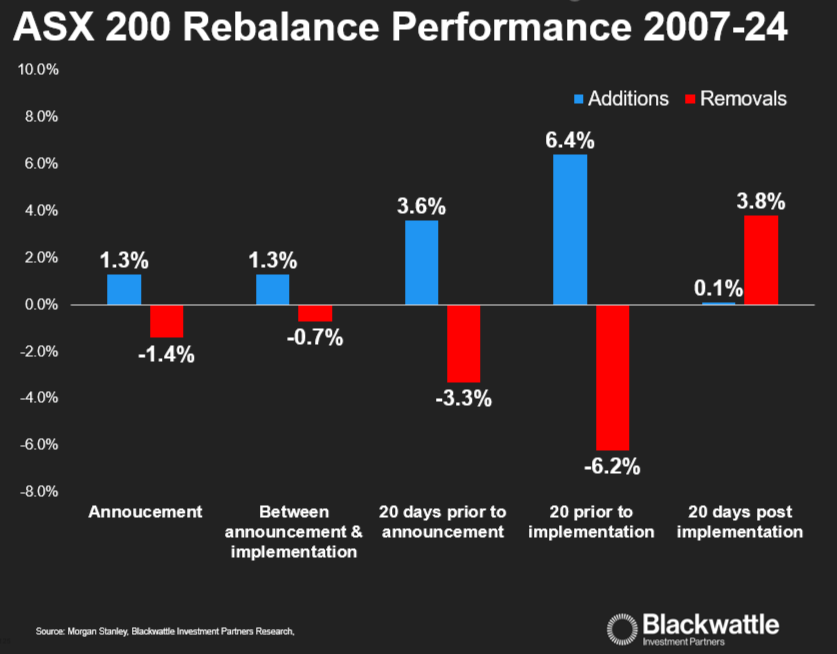
These findings are indicative of growing market distortions, much like life in the fishbowl. For those investors looking in from the outside the fishbowl, surely, they must be asking:
Are these conditions sustainable, or merely symptoms of euphoric markets?
Regardless, one thing is clear: momentum does not recognise a margin of safety.
Secondly, as market distortions grow — driven by shifts in market microstructure — the importance of prudent portfolio construction becomes more critical than ever.
ASX Valuations: Where are the opportunities and pitfalls?
Market volatility and valuation elasticity—once confined to small-cap companies—are now increasingly common among the largest ASX-listed firms, creating and evaporating billions of market value.
To borrow from Paul Tudor Jones: "Winners average winners, while losers average losers", except with little regard to valuation support.
As a result, 10% share price swings during earnings season or trading updates, followed by strong follow-through moves, have become the norm as trading strategies rapidly adjust to new price and earnings signals.
Take Commonwealth Bank (ASX: CBA), Wesfarmers (ASX: WES), and REA Group (ASX: REA)— exceptional businesses, no doubt.
Yet their PE multiples have expanded by 50–80% since 2019, reaching nearly three standard deviations above historical norms. In simpler terms, irrational exuberance is creeping in some parts of the market.
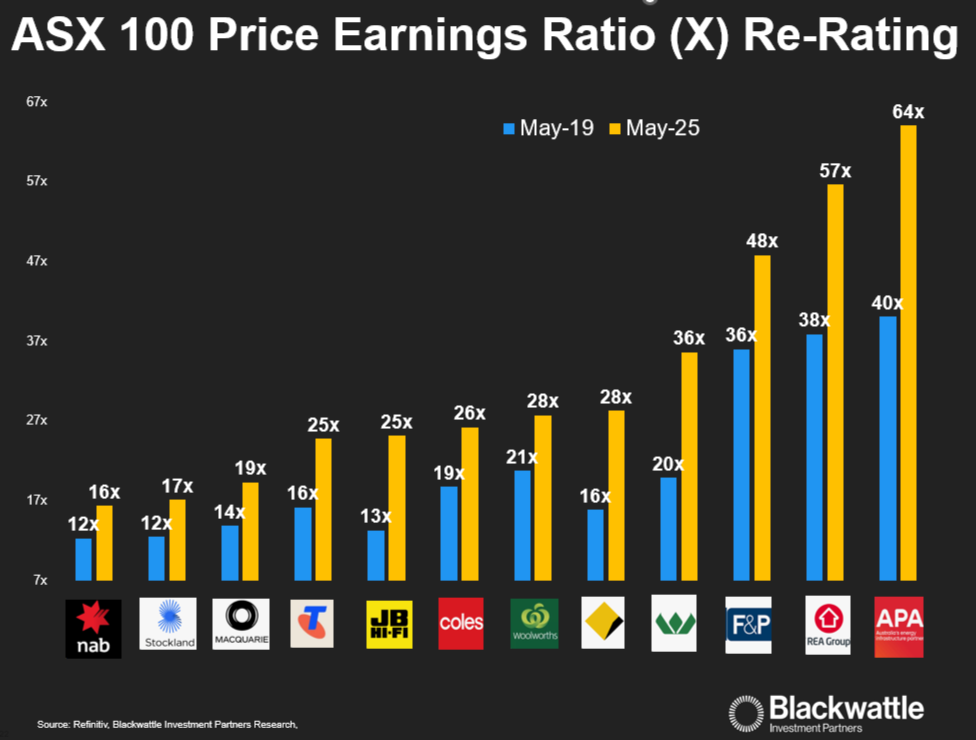
If CBA's PE were to compress from 28.3x to a still-high 22x over the next five years, total REAL returns could be -28%.
This even considers dividends which offer a return below the Australian 10-year bond.
Sound improbable?
CSL was once the poster child of ASX global biotech success. Five years later, capital allocation missteps, concerns over tariffs and U.S. drug pricing have slashed its PE ratio by more than half.
A hard lesson in valuation compression following years of underperformance.
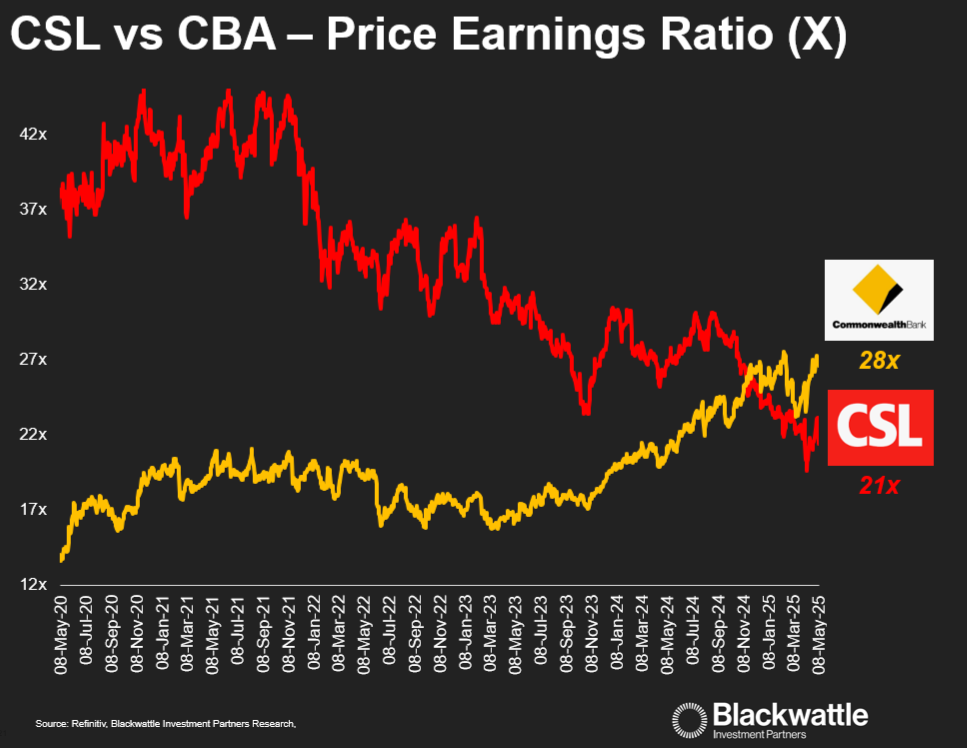
Popularity is risk, unpopularity is opportunity
Some companies have been derated for a good reason — like declining demand for office real estate or coal-fired power.
However, others, such as BHP, CSL, Amcor (ASX: AMC), Reliance Worldwide (ASX: RWC) and ResMed (ASX: RMD), now stand to offer compelling valuation support relative to their history and relative to the market as investors discount cyclical concerns or rising regulatory risks.
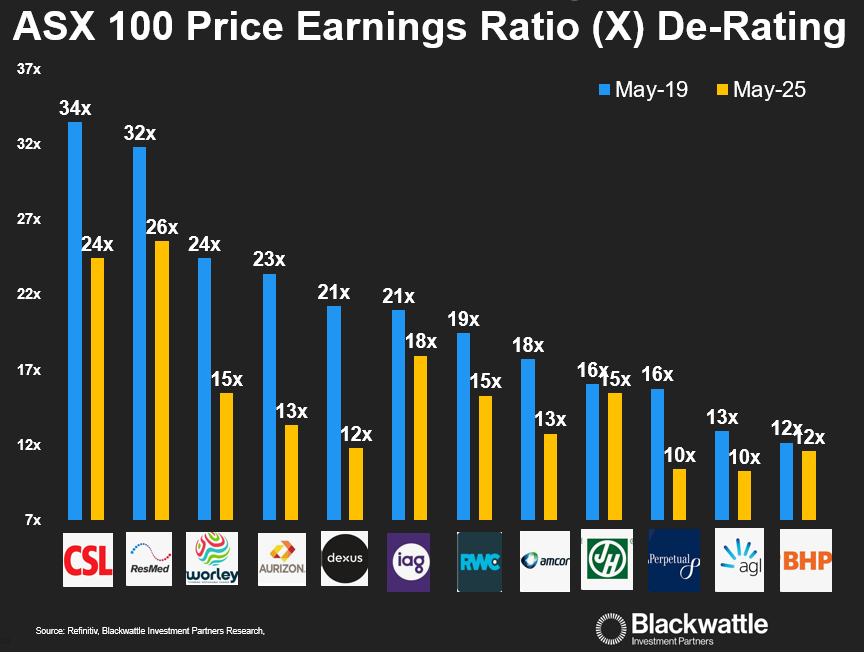
We can't know what the catalyst will be for investors to embrace these companies, but these are the types of opportunities we've been accumulating. When we see companies like these with strong market positions trading at attractive valuations, it generally signals the potential for more favourable future returns.
When actual outcomes diverge significantly from overly pessimistic market expectations, sentiment can shift rapidly, leading to substantial revaluations in share prices.
That brings me to my second crucial lesson: Quality matters just as much as valuation.
The importance of durable quality
Given an index dominated by banks and mining companies, I often get asked how do we determine quality?
Its companies with strong market positions, sustainable return on capital, and aligned management. This becomes paramount when when economic shocks hit, as Darwinian selection takes over and the strong get stronger.
Back in the early 2000s, under Huntley and Warnes, I learned the enduring value of owning quality companies with one personal misstep cementimg this lesson.
I initiated coverage on a speculative company, Millepede International (ASX: MPD), which had developed a reusable fastener system that was undertaking trials with major partners, including RadioShack, BellSouth, and even the UK Military.
Back then Radioshack was a titan – with a store base of over 7000 stores - imagine the excitement!
Each new announcement sent the share price soaring.
But sales to match investor expectations never materialised. The product was expensive and failed to beat commodity alternatives. The company was eventually de-listed.
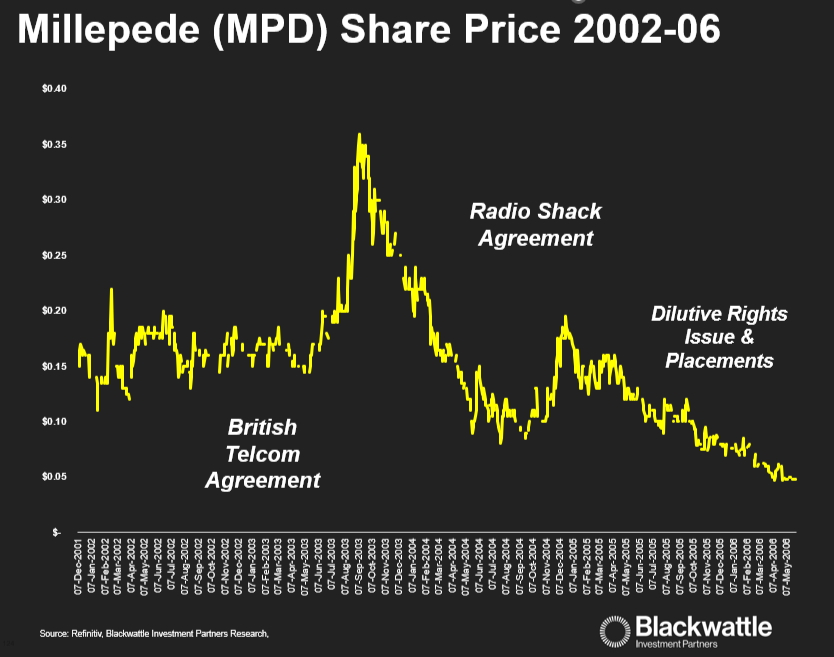
The lessons learnt were twofold:
Firstly, the entrepreneurial spirit deserves respect — as all great companies start with big ideas and bold ambitions.
However, investors must remember that when capital is needed, management becomes the best promoter. Big markets, lofty projections, and high valuations often follow.
Secondly, the risk of capital loss is highest in a company's early stages. That's why we favour profitable, established businesses with durable advantages — those that can scale, reinvest, and attract top talent.
This "flywheel effect" of competitive advantage is where real shareholder value is created.
In contrast, speculative names — sometimes propelled by passive ETF flows into the ASX 200 — can present compelling shorting opportunities. The "Millepede Lesson" remains etched in my memory, serving as a valuable reminder whenever a similar pattern begins to emerge.
Competitive advantages on display in May
May was a packed month of company strategy days and corporate access, giving us exposure to executive teams and operational details that help distinguish quality from hype.
Getting out to these sessions is always insightful and helps reduce the risk of being swayed by a charismatic company leader promoting a new reusable fastener product!!
Here are a few that stood out:
- Wesfarmers (ASX: WES): Management highlighted that shareholder returns are driven by being singularly focused on providing customers with the most affordable products across Bunnings, Kmart, Officeworks and Priceline. Empowering divisional autonomy and entrepreneurial growth has led to attracting the best talent, with capital preferentially deployed into existing businesses to strengthen their market position. A relentless focus on productivity means that savings are reinvested in lower prices for customers, driving market share growth.

- SGH Group (ASX: SGH) – SGH showcased its owner-operator model, which elevates management autonomy and accountability to deliver shareholder returns. This has been evident in Boral's turnaround, where the increased focus on customer service and reliability has been a key driver of its pricing power. The money lost by contractors and developers waiting on delayed delivery of cement (for example) far exceeds any price premium that might be charged for reliable, on-time performance.
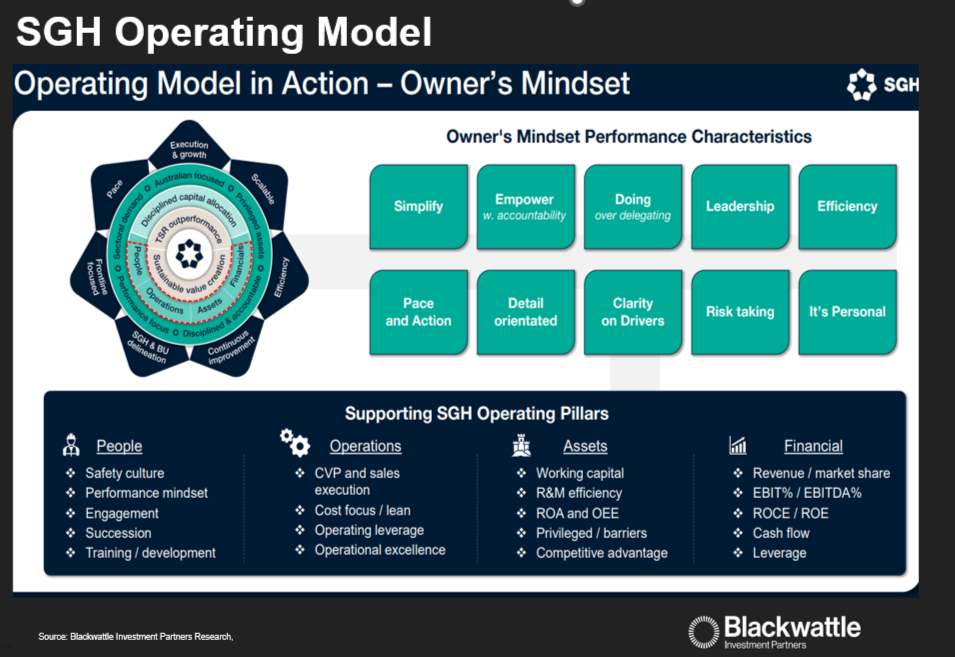
- ALS Limited (ASX: ALQ) – is benefiting from several trends in regulation and outsourcing, leading to a strong demand for environmental testing services. This has created a strong pipeline of opportunities that require capital to fund capacity expansion. A unique single Laboratory Information Management System (LIMS) enables ALS to plan and manage network capacity, resulting in above-industry margins and returns.
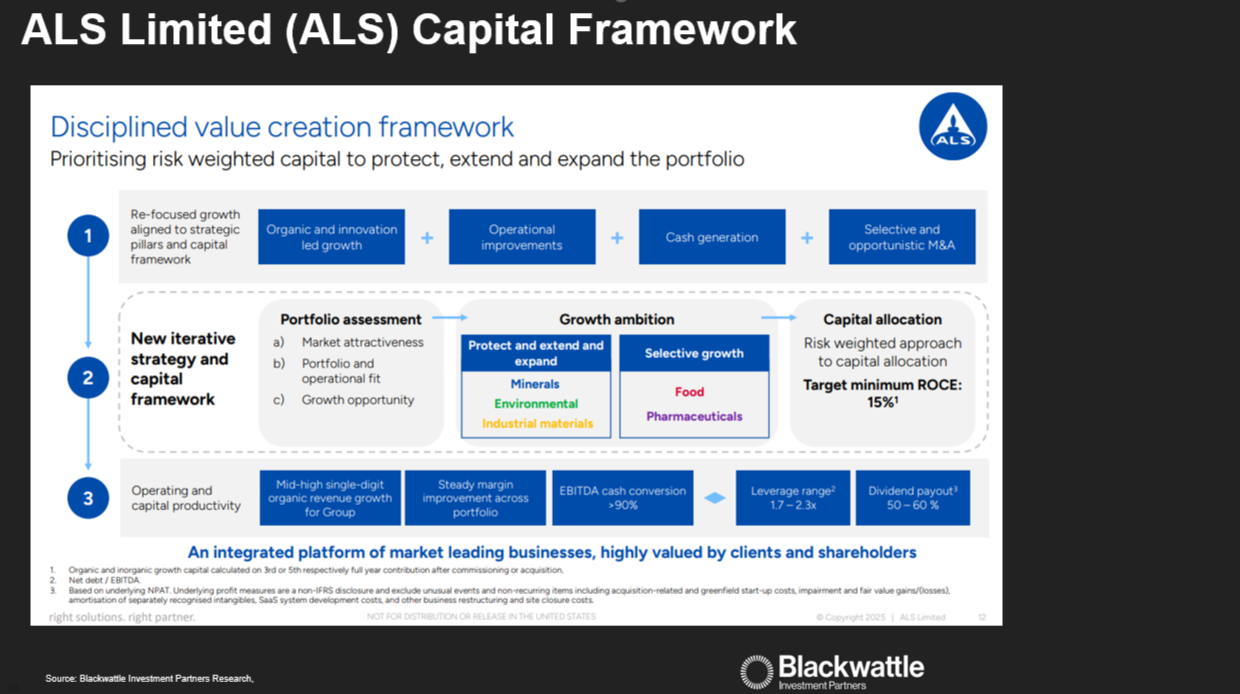
- Telstra (ASX: TLS) – in an otherwise slow-growth industry plagued by low-returning competitors, management have done a good job on productivity and offsetting cost inflation. Doubling down on customer satisfaction through network quality and reliability, as well as streamlining customer service with digital and artificial intelligence, will only widen the gap between competitors. If all of this can be accomplished, Telstra's mobile network and infrastructure assets should produce consistent earnings.
- Cleanaway (ASX: CWY) – Highlighted its national infrastructure waste network, which is attractive to large companies with a national presence, e.g. McDonald's and Coles. Cleanaway also provides these customers with auditing and tracking of key waste data, enabling large customers to track recycling rates. A focus on efficiency under the Branch Led Operating Model also ensures a lean cost base, positioning the company well for contract tenders.
- Seek (ASX: SEK): Seek operates the leading employment marketplace in Australia and parts of Asia. Market strength is evident, with a placement share of 35%, which has steadily increased since 2022. Following four years of system investment, Seek showcased the integration of artificial intelligence applications across its products to help hirers and job seekers improve matching, significantly increasing hirer-seeker satisfaction. More personalised experiences and better matches lead to greater marketplace trust.
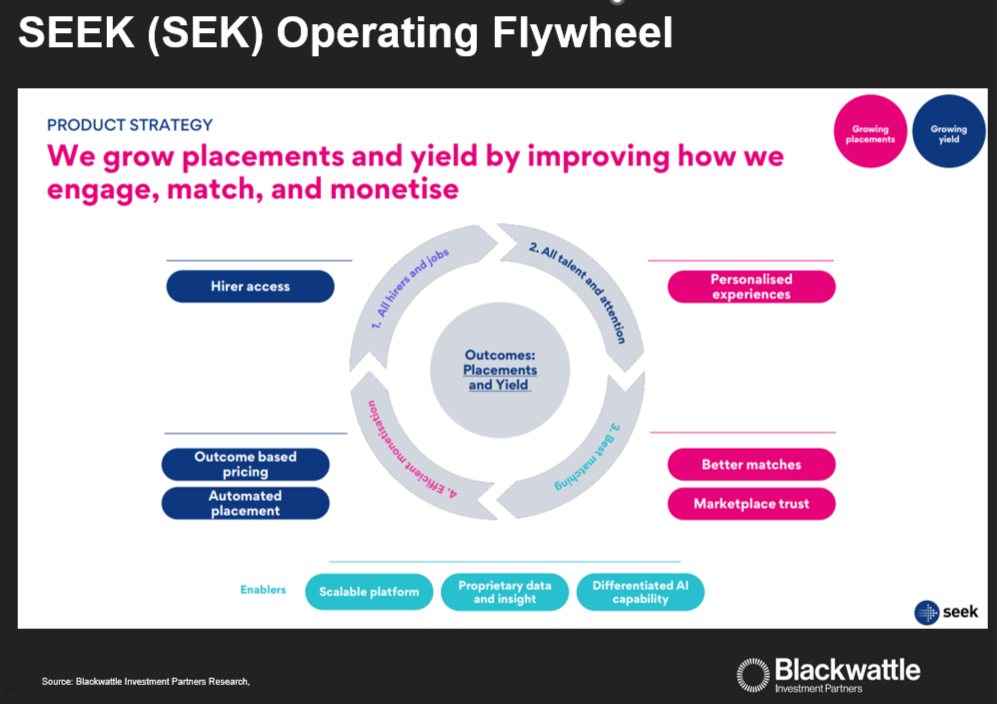
So…do valuations still matter?
Absolutely.
Once you step outside the fishbowl, the picture becomes clearer.
Valuation has always been — and remains — a critical driver of long-term returns. This is often obvious in hindsight but rarely in the moment when noise and narratives overshadow fundamentals.
But valuation is only half the equation.
The other half is quality — owning good businesses with enduring competitive advantages that can weather storms, adapt to change, and grow shareholder value over time.
In markets distorted by short-term flows and passive euphoria, long-term investors must focus on the fundamentals: pay a fair price, own quality assets, and maintain the discipline to step outside the fishbowl.
These growing distortions not only necessitate the role of prudent portfolio construction, but are also creating growing opportunities to buy/short mispriced companies — as passive and momentum flows react violently to short term news.
3 topics
5 stocks mentioned

